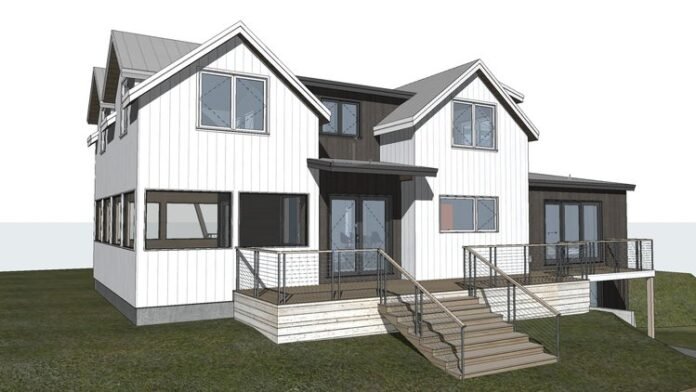Residential Architectural Design is the practice of planning, designing, and overseeing the construction of homes. This process involves working closely with clients to create a living space that meets their specific needs and reflects their lifestyle. It’s more than just drafting blueprints—it’s about integrating the latest design trends, sustainability principles, and functional requirements to deliver homes that are both beautiful and practical.
What Is Architectural Residential Design?
Architectural Residential Design is the process through which architects and designers conceptualize and create residential spaces. This architecture focuses on private homes, apartments, and residential complexes, ensuring they are aesthetically pleasing, functional, and tailored to the homeowner’s preferences.
Architects specializing in residential design work closely with clients to understand their needs, desires, and lifestyle choices. The outcome is a home that feels like an extension of the client’s identity—designed to suit their daily routines, accommodate personal tastes, and promote comfort.
Key Elements of Effective Architectural Residential Design
An effective residential design goes beyond appearances. It’s about creating a space that supports the homeowner’s lifestyle while maintaining a timeless aesthetic. The following elements are crucial:
- Space Planning: Efficient use of space is vital in any home design. Thoughtful space planning ensures every room serves its intended purpose, creating a seamless flow between areas.
- Natural Light: Proper integration of natural light not only enhances aesthetics but also improves energy efficiency and promotes wellbeing.
- Aesthetic Harmony: A well-designed home ensures that the exterior complements the interior, creating a cohesive design throughout the property.
- Functionality: Residential design should prioritize functionality, ensuring that the layout serves the practical needs of the homeowner, from storage solutions to energy-efficient systems.
Why Architectural Design Matters?
Architectural Design plays a significant role in shaping how we live. Well-designed homes enhance the quality of life by providing spaces that cater to the daily needs of the occupants. A thoughtfully designed residence:
- Improves daily life: A home designed with the homeowner’s routine in mind can drastically improve comfort and functionality.
- Increases efficiency: Modern design elements focus on sustainability and energy efficiency, reducing the long-term cost of homeownership.
- Creates value: Thoughtful design boosts the aesthetic and functional value of a home, making it more appealing to future buyers and increasing property value.
Custom Homes vs. Pre-Made Designs: The Role of Residential Architects
While pre-made designs offer convenience, custom homes offer a unique opportunity to create a space that is truly personal.
- Custom Homes: These are tailored specifically to the homeowner’s vision, lifestyle, and needs. Custom homes provide flexibility in design, allowing the homeowner to choose everything from the layout to the materials used.
- Pre-Made Designs: Often referred to as “cookie-cutter” designs, these homes are built from standardized templates. While they are cost-effective and quicker to build, they lack the personalization of custom homes.
Sustainable Design in Residential Architecture
Sustainability has become a cornerstone of modern residential design. Architects are increasingly incorporating eco-friendly materials, energy-efficient technologies, and sustainable practices to reduce the environmental impact of homes.
Key sustainable design elements include:
- Energy Efficiency: Incorporating insulation, energy-efficient windows, and solar panels can significantly reduce a home’s energy consumption.
- Sustainable Materials: Using recycled or locally sourced materials reduces the environmental footprint of the construction process.
- Water Management: Designing homes with rainwater collection systems and drought-tolerant landscaping helps conserve water.
Sustainable design not only benefits the environment but also reduces the long-term costs of maintaining the home.
The Importance of Functional Interior Spaces
Interior spaces are just as important as the structure of a home.
Key considerations for functional interiors include:
- Open Layouts: Open plan designs foster flexibility and make spaces feel larger and more connected.
- Storage Solutions: Well-planned storage areas, such as built-in cabinets and closets, help maintain order and enhance functionality.
- Ergonomic Design: Furniture and room layouts should prioritize comfort and accessibility, ensuring the space accommodates the needs of the occupants.
By balancing aesthetics with practical elements, functional interior spaces contribute to a more comfortable and efficient living environment.
How Architectural Design Enhances Property Value
Investing in high-quality residential design can significantly increase the value of a property. A well-designed home attracts potential buyers by offering a combination of style, functionality, and efficiency.
- Curb Appeal: The exterior design of a home, including landscaping and architectural style, is often the first thing buyers notice. Homes with strong curb appeal tend to sell faster and at higher prices.
- Energy Efficiency: Homes designed with sustainability in mind are more attractive to buyers due to lower utility costs and environmental benefits.
- Functional Layouts: Buyers appreciate homes with intuitive layouts that make daily living easier, increasing the overall appeal of the property.
Bring Your Dream Home to Life—Start Designing Today!
If you’re looking to create a custom residence or enhance your current space with modern Residential Architectural Design, consider contacting Hellbent Studio in Maine. From sustainable solutions to innovative architectural approaches, Hellbent Studio ensures your home reflects your unique style and needs. Reach out to Hellbent Studio today and start your journey.



